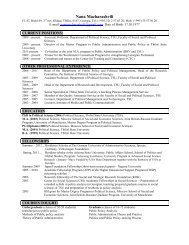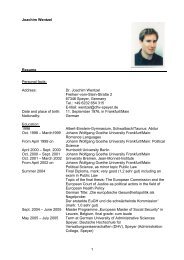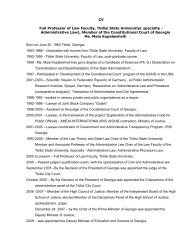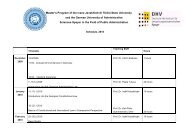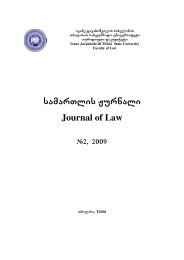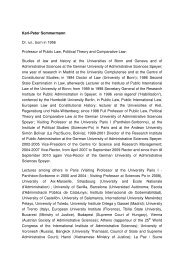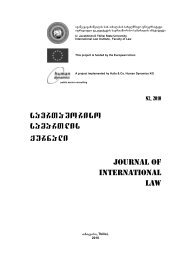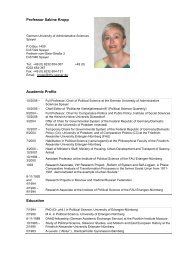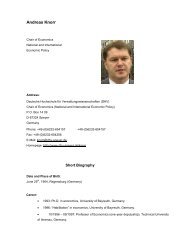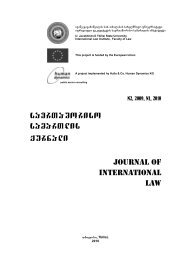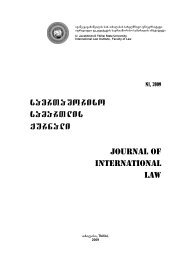Untitled
Untitled
Untitled
You also want an ePaper? Increase the reach of your titles
YUMPU automatically turns print PDFs into web optimized ePapers that Google loves.
K. KHUTSISHVILI, SHALL PROTECTION OF SOVEREIGN IMMUNITIES SUPERSEDE PROTECTION...<br />
subsequent practice of the UN SC has shown<br />
that the situation with regard to the human<br />
rights protection has been recognized as a<br />
threat to international peace and security and<br />
international criminal tribunals have been set<br />
up by the UN to judge leaders of individual<br />
states notwithstanding their sovereign equality<br />
with other states. If the Security Council<br />
decide that a threat to or a breach of peace<br />
and security are caused by the actions of high<br />
level officials which at the same time cause<br />
human rights atrocities, the Security Council<br />
shall be authorized along with other measures<br />
to pronounce that these criminal leaders fall<br />
under universal jurisdiction and may be prosecuted<br />
for commission of international crimes<br />
by courts of any nation. The Security Council<br />
can rule this even in respect of the criminal<br />
leaders or high ranking officials even when they<br />
are still in office.<br />
The Statute of the International Criminal<br />
Court recognizes possibility of lifting the immunity<br />
of those leaders in order to punish<br />
them for international crimes. Therefore, the<br />
conclusion that the universal jurisdiction over<br />
crimes belonging to the group of “international<br />
crimes” must be recognized, giving world<br />
community a possibility to prosecute and judge<br />
criminal leaders for human rights atrocities and<br />
the Security Council (as a political body) as<br />
well as the International Court of Justice (as a<br />
judicial body) can be well used as balancing<br />
international bodies able to oversee and control<br />
the maintenance of sovereign equality<br />
among states, but at the same time, ensuring<br />
that the most heinous atrocities do not go unpunished<br />
due to legal limitations and gaps.<br />
Conclusion: sovereign equality of states,<br />
immunity of heads of states and other high<br />
ranking policy makers does not mean that<br />
egregious human rights atrocities shall be tolerated<br />
and allowed by them. If the theory of<br />
humanitarian intervention seems to be emerging<br />
and becoming an established form of intervention<br />
into domestic matters of sovereign<br />
states, when the human tragedy reaches unimaginable<br />
scale, when there is a principle of<br />
universal jurisdiction existing for the most atrocious<br />
crimes, the right of any state to try the<br />
highest ranking officials must be recognized<br />
as a solid rule of law and must be observed at<br />
all times to serve justice and protect thousands<br />
from undeserved violation of their rights. The<br />
Idea of human rights protection has already<br />
transgressed state boundaries and has become<br />
a concern of wider international community.<br />
Promotion and protection of victims of<br />
atrocities is particularly attracting speeches of<br />
political leaders and has become a part of at<br />
least the declared political agendas of the<br />
mighty. Apart from technical problems, related<br />
to apprehension and serving sentences<br />
there shall not be any additional prescriptions<br />
barring prosecution of highest ranking officials,<br />
responsible for mass human rights atrocities.<br />
After all, do any of the immunities cost a thing<br />
vis-À-vis the outcry of victims of mass atrocities<br />
In the era of human rights protection judging<br />
only lower-ranking criminals and allowing<br />
those who mastermind and direct mass human<br />
rights atrocities to claim immunities must<br />
not be tolerated. At the same time, a group of<br />
people entitled to the immunities may be expanded,<br />
taking into account the contemporary<br />
developments of interstate relations and there<br />
may be more perpetrators emerging shielding<br />
behind the immunity in the age when humanitarian<br />
intervention for the most outrageous<br />
crimes seem to be becoming a part of<br />
contemporary international law.<br />
In the world, where human rights protection<br />
is no longer considered to be exclusively<br />
internal matter of a sovereign state, where<br />
elections monitoring is undertaken by international<br />
observers and international organizations<br />
can reach as far as prison cells in any<br />
given state, the notion of state immunity and<br />
inviolability of state officials responsible for<br />
gravest human rights atrocities shall not be<br />
staying outside the reach of any state and within<br />
the compound of sovereign state, which<br />
most probably will do nothing to deal with the<br />
matter. Atrocities must be punished. Only ad<br />
hoc international criminal tribunals will not suffice<br />
to achieve this goal. The “complementarity”<br />
principle of the International Criminal Court<br />
has its negative sides. Therefore, recognition<br />
of universal criminal jurisdiction over most<br />
egregious – or international crimes – must be<br />
the way forward and towards recognition of<br />
unavoidable punishment. Those deserving<br />
must be punished and state immunity can not<br />
be shamelessly be used to escape the deserved<br />
punishment.<br />
75



